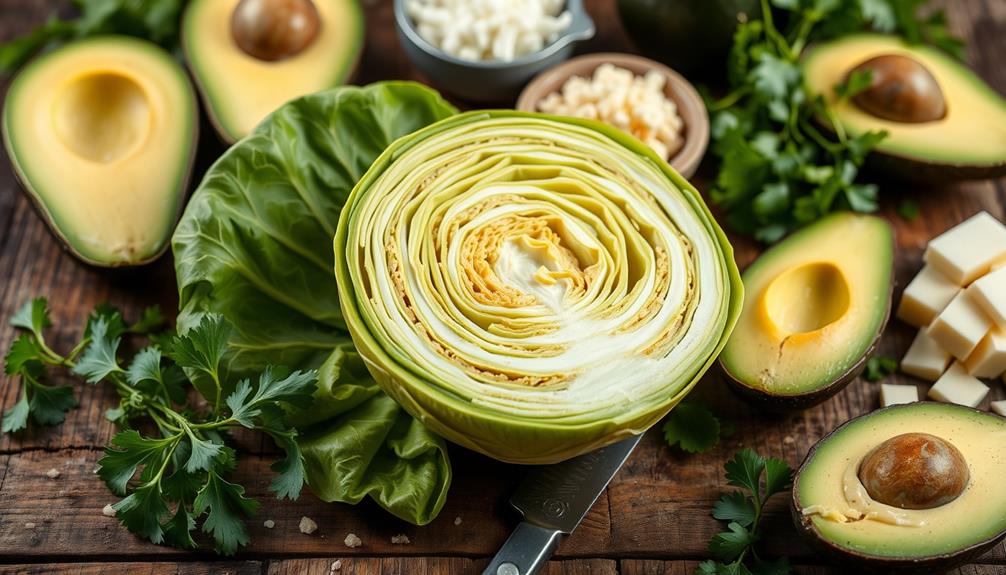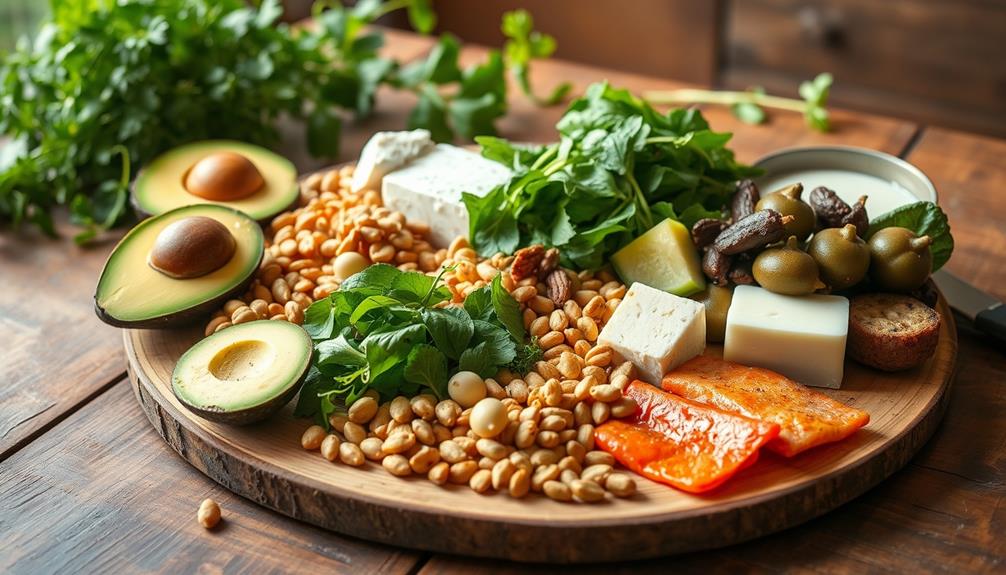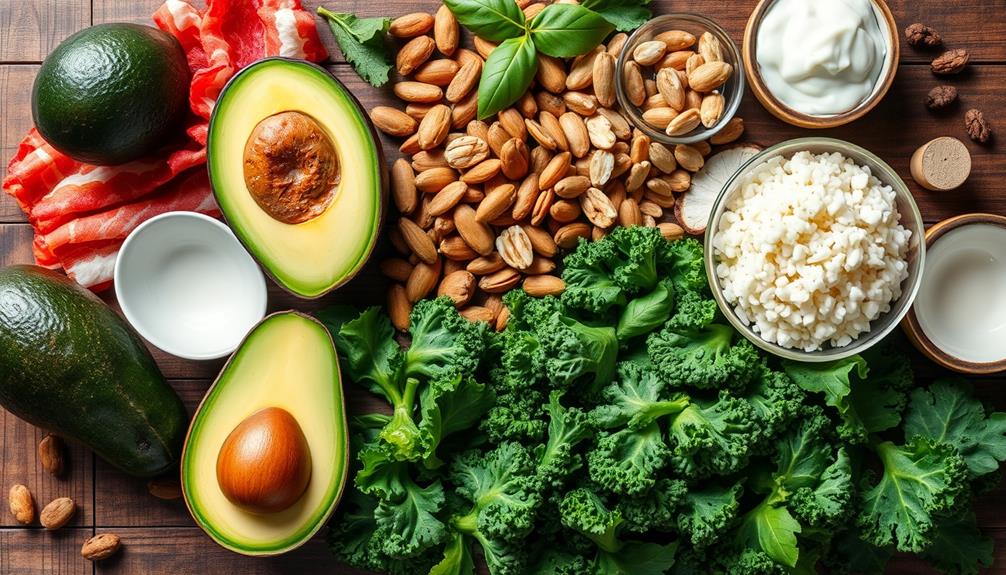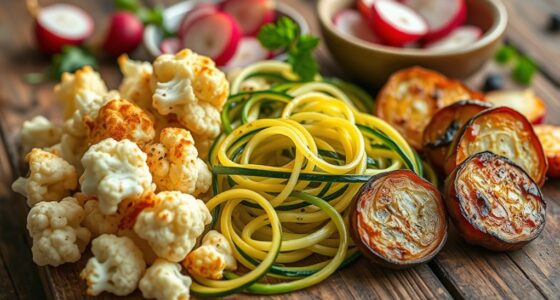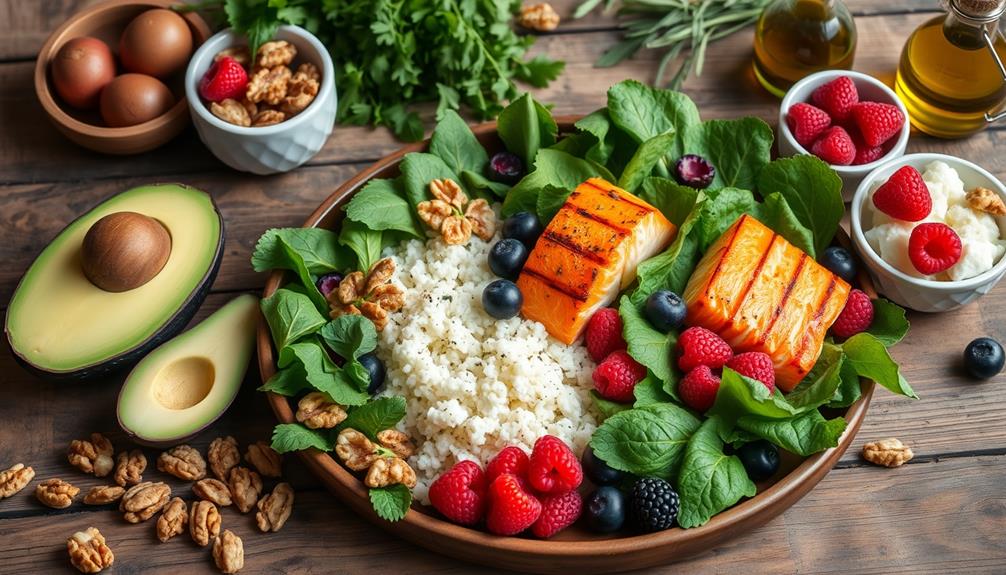Yes, cabbage is definitely keto diet friendly! With only about 2 to 4 grams of net carbs per cup, it's a great low-carb option. You'll find that it's packed with essential nutrients, fiber, and only around 25 calories. Varieties like napa and bok choy have even fewer carbs, making them excellent choices for salads or stir-fries. Cabbage also supports digestive health and is versatile in many recipes, from soups to wraps. It's perfect for meal prep too! Stick around, and you'll discover some delicious cabbage recipes to spice up your keto meals.
Key Takeaways
- Cabbage contains low net carbs, making it suitable for keto diets, with as little as 1.5 to 4.7 grams per cup depending on the variety.
- It is low in calories, providing only about 25 calories per cup, allowing for guilt-free consumption on a keto diet.
- The high fiber content (approximately 2 grams per cup) aids digestion and helps maintain satiety, aligning with keto dietary goals.
- Cabbage is nutrient-dense, offering essential vitamins like C and K, supporting immune and bone health without excess carbs.
- Its versatility in recipes, such as stir-fries and salads, allows for diverse meal options while adhering to keto principles.
Cabbage Nutrition Facts
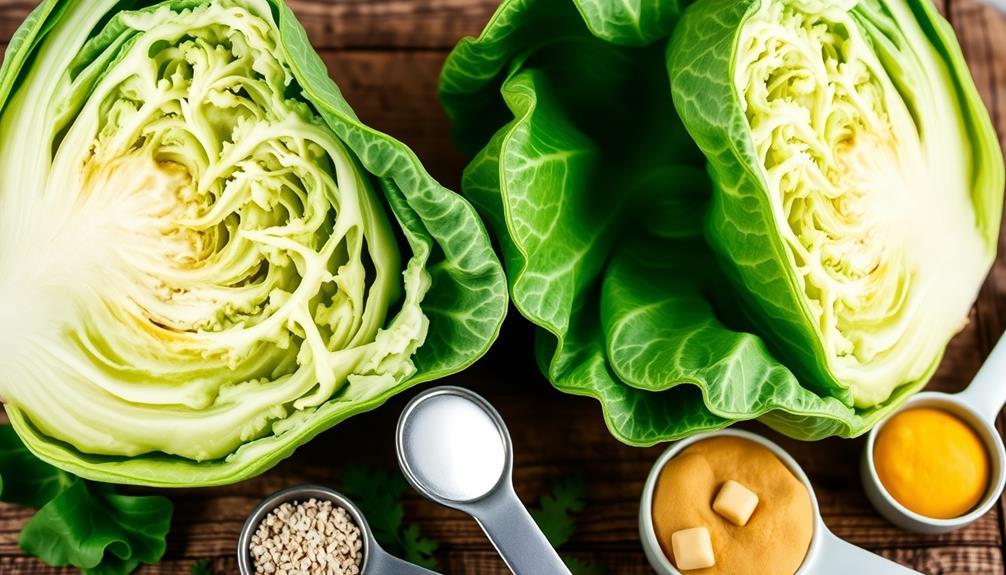
Cabbage is a fantastic choice for anyone on a keto diet, offering just 4 grams of total carbohydrates per cup, which translates to only 2 grams of net carbs after you factor in the fiber. This low carb profile makes it an ideal addition to your meals while keeping you well within your daily carb limits.
Additionally, incorporating cabbage into your diet can contribute to your overall budgeting for healthy eating by providing a nutritious and affordable vegetable option.
When you explore the nutrition facts of cabbage, you'll discover it's also a low-calorie option, containing only about 25 calories per cup. This means you can enjoy a generous serving without worrying about excess calories.
Plus, cabbage is incredibly low in fat, with 0 grams per cup, and it provides 1 gram of protein, adding to its appeal for those focused on a balanced keto diet.
Moreover, each cup of shredded raw cabbage is packed with about 26 mg of vitamin C, which accounts for roughly one-third of your daily requirement.
With its high fiber content of about 2 grams per cup, cabbage not only supports your low carb lifestyle but also promotes digestion and gut health.
Health Benefits of Cabbage

Cabbage packs a powerful punch when it comes to nutrient density, offering essential vitamins and minerals without piling on the carbs.
Its high fiber content not only aids digestion but also helps you feel full longer, making it a smart choice for your keto diet.
Additionally, cabbage is rich in antioxidants, which can support overall health by reducing inflammation and the risk of chronic diseases.
Plus, those antioxidants found in cabbage can support your overall health by reducing inflammation and the risk of chronic diseases.
Nutrient Density Benefits
When you incorporate cabbage into your meals, you're not just adding volume; you're boosting your nutrient intake considerably. This low-calorie vegetable has only about 25 calories per cup, making it an excellent choice for weight management while still providing essential nutrients.
With approximately 26 mg of vitamin C per cup, cabbage helps support your immune health, giving you about one-third of your daily requirement. Moreover, cabbage is rich in antioxidants, which may play a role in reducing inflammation and supporting overall health, similar to the benefits of cranberry juice consumption.
Cabbage is also rich in vitamin K, which is crucial for bone health and proper blood clotting. With its low net carbs per ½-cup—around 2 grams—it's perfect for those following a keto diet, allowing you to enjoy nutrient-dense meals without the extra carbohydrates.
Additionally, cabbage contains beneficial antioxidants like sulforaphane, which may reduce inflammation and lower the risk of chronic diseases.
Plus, the high fiber content—approximately 2 grams per cup—contributes to your overall wellness by promoting gut health.
Digestive Health Support
Digestive health thrives on fiber, and cabbage delivers just that. With about 2 grams of fiber per cup, cabbage is an excellent choice for promoting healthy digestion and preventing constipation. Its high fiber content acts as a prebiotic, feeding the beneficial bacteria in your gut, which enhances overall digestive function.
Additionally, incorporating cabbage can be part of a balanced diet rich in fruits and vegetables, which supports overall health and longevity.
Incorporating cabbage into your diet not only supports digestion but also provides additional benefits:
- Low in carbs: Perfect for those following a keto diet.
- Anti-inflammatory properties: Compounds like sulforaphane help protect your digestive tract from certain diseases.
- Probiotic source: Fermented cabbage, like sauerkraut and kimchi, offers probiotics that further improve gut health.
- Low-calorie: Cabbage is nutrient-dense, making it an ideal choice for maintaining a balanced diet.
Cabbage Varieties for Keto
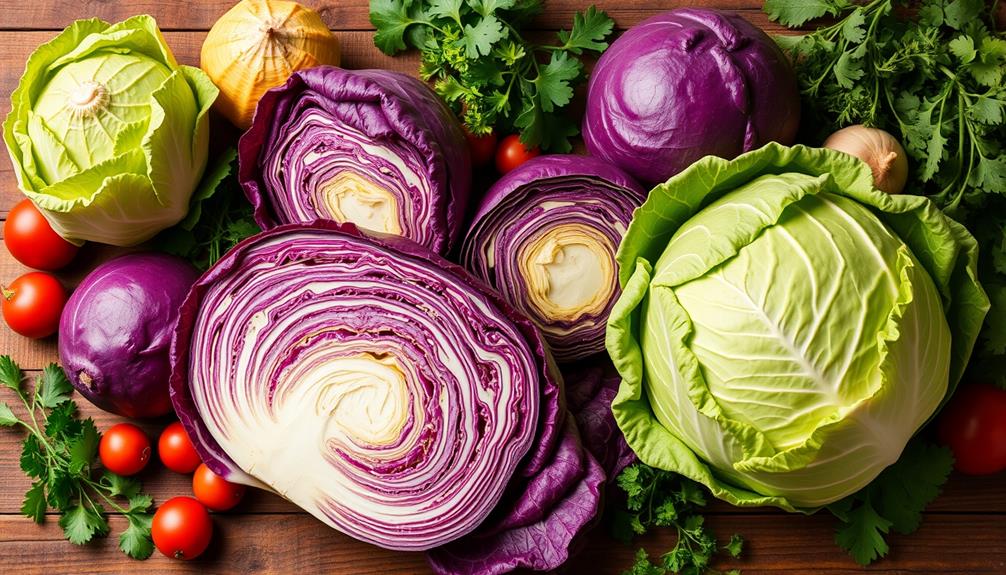
When you're choosing cabbage for your keto diet, several varieties can fit the bill. Each type offers unique nutritional benefits and carb counts, making it easy to find one that suits your meals.
Incorporating low-carb vegetables like cabbage can be beneficial for maintaining your health while on a keto diet, as they're often rich in vitamins and minerals foods beneficial for managing gout symptoms.
Let's explore the different cabbage options and how they can enhance your keto lifestyle.
Types of Cabbage Varieties
Exploring various cabbage varieties can enhance your keto meals while keeping your carb count low. Each type of cabbage brings its own unique flavor and nutritional benefits, making them perfect for a low-carb lifestyle.
Additionally, incorporating low-carb vegetables can be beneficial for overall health and weight management, as protecting your savings is vital in financial planning. Here are some top cabbage varieties you might want to include in your diet:
- Green Cabbage: The most common variety, with about 2.9 grams of net carbs per cup, it's fantastic for salads and sides.
- Red Cabbage: Slightly higher in carbs at 4.7 grams of net carbs per cup, it adds a pop of color and is rich in antioxidants.
- Savoy Cabbage: With around 3 grams of net carbs per cup, its tender leaves are ideal for wraps and salads, offering a milder taste.
- Napa Cabbage: Very low in carbs, containing less than 2 grams of net carbs per cup, it's perfect for stir-fries and soups.
Incorporating these cabbage varieties into your meals not only helps you stay in line with your keto goals but also boosts your intake of vitamin C and other essential nutrients.
Enjoy experimenting with these delicious options!
Nutritional Benefits of Cabbage
Cabbage offers numerous nutritional benefits that make it an ideal choice for your keto diet. As a member of the cruciferous vegetables family, cabbage packs a punch with its low-carb content.
Various brewing methods affect how we perceive flavors, similar to how different cabbage varieties can enhance the taste of dishes. For instance, green cabbage contains only about 2.9 grams of net carbs per cup, making it a fantastic low-carb option for dishes like cabbage soup.
If you prefer something with a bit more color and antioxidants, red cabbage has approximately 4.7 grams of net carbs per cup.
Napa cabbage is another excellent choice, boasting less than 2 grams of net carbs per cup, perfect for salads or stir-fries.
Savoy cabbage, with its tender leaves and mild flavor, contains around 3.5 grams of net carbs per cup, making it versatile for various keto recipes.
Last but not least, bok choy is a standout, containing just 1.5 grams of carbs per cup, while also being rich in vitamins A and C.
Keto-Friendly Cabbage Recipes
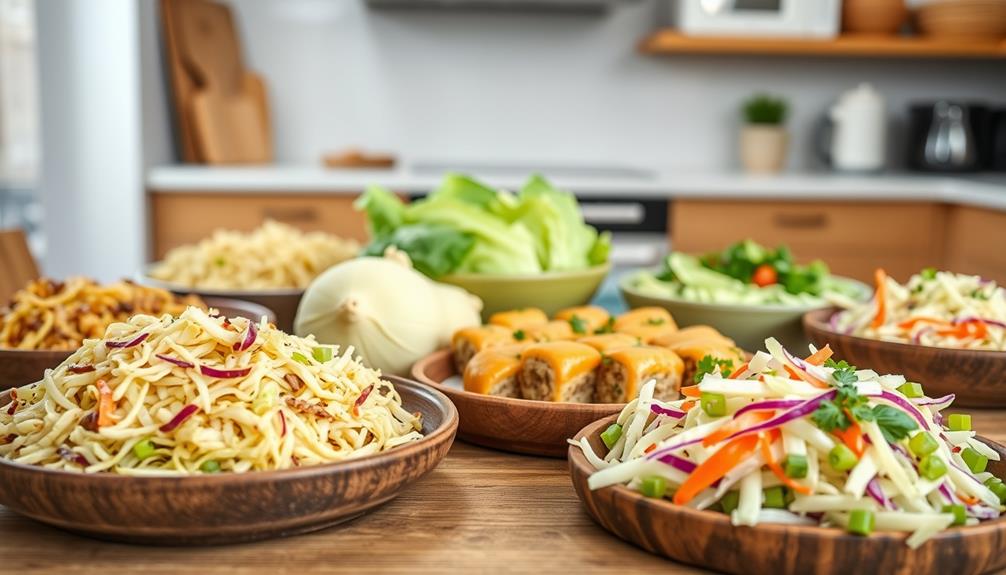
If you're looking for delicious ways to incorporate cabbage into your keto diet, you're in luck! Cabbage is low in calories and offers less than 5 grams of net carbs per cup, making it a fantastic ingredient for various keto cabbage recipes.
Additionally, using certain essential oils, like peppermint oil, can offer benefits that complement your healthy eating habits. Here are some tasty options to contemplate:
- Keto Southern Fried Cabbage With Bacon: This dish combines sautéed cabbage and onions with crispy bacon for a flavorful, easy-to-make side that complements any meal.
- Keto Cabbage Hash Browns: Shredded cabbage and eggs come together to create a delicious low-carb pancake, perfect for breakfast or brunch.
- Low-Carb Pizza-Stuffed Cabbage Rolls: Enjoy all the flavors of pizza while keeping your carb count low. These rolls are both satisfying and healthy.
- Fermented Cabbage Dishes: Kimchi and sauerkraut not only enhance the flavor of your meals but also boost nutrient density, making them excellent additions to your keto meal plan.
With these keto-friendly cabbage recipes, you can enjoy variety while keeping your carbs in check!
Cabbage Cooking Methods
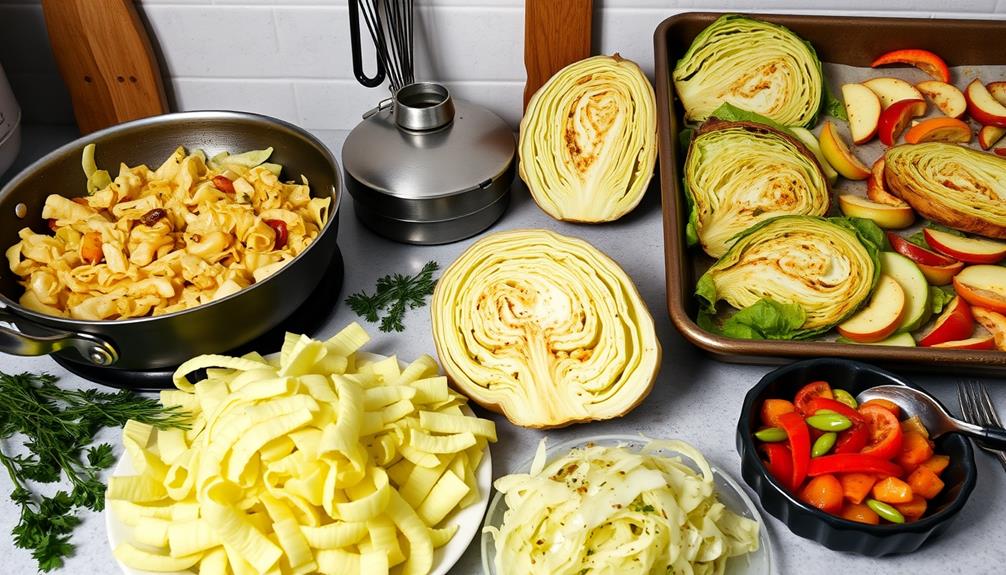
When it comes to preparing cabbage, several cooking methods can bring out its unique flavors and textures while keeping your keto diet intact. One of the quickest and easiest ways is sautéing cabbage with garlic and spices, which enhances its flavor and makes it a delicious keto addition to your meals.
Additionally, utilizing content relevance and authority in your meal preparations can help you create dishes that aren't only tasty but also aligned with your dietary goals.
If you're looking for a nutritious meal, try stir-frying cabbage with your favorite protein and other low-carb vegetables. This method takes only about 5-10 minutes, making it perfect for those quick and easy keto nights.
For a healthy snack, consider baking or air-frying cabbage to create crispy cabbage chips. Season them to your taste for a satisfying crunch.
You can also make cabbage steaks by cutting thick slices and grilling or roasting them. This nutrient-rich side dish is versatile and easy to prepare.
Cabbage in Meal Prep
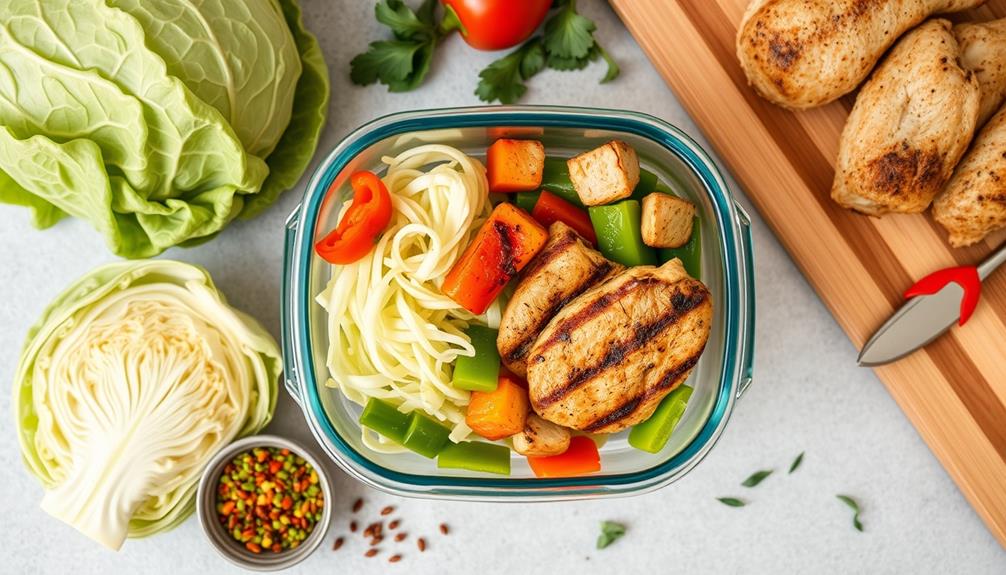
For anyone looking to simplify their weekly cooking routine, incorporating cabbage into meal prep can be a game changer. This budget-friendly vegetable is versatile and can easily enhance your low-carb meals.
Cabbage is also a great source of vitamins and minerals, making it a nutritious addition to your dishes. When stored properly, cabbage stays fresh in your refrigerator for up to a week, making it perfect for meal prep.
Hamster care and costs highlight that a good diet is essential for overall health, and cabbage can be a part of that philosophy.
Here are some great ways to use cabbage in your weekly cooking:
- Use shredded cabbage as a base for salads or slaws, adding a crunchy texture.
- Prepare cooked cabbage dishes, like stir-fries, in bulk for convenient low-carb options.
- Experiment with fermented cabbage options like sauerkraut or kimchi for added probiotics and flavor.
- Mix cabbage raw into soups or wraps to keep your meals interesting and diverse.
Cabbage as a Low-Carb Alternative

Cabbage shines not just in meal prep but also as a fantastic low-carb alternative for those on a keto diet. With only about 2-4 grams of net carbs per cup, it's a go-to for keeping your carb counts low. For instance, raw green cabbage has approximately 2.9 grams of net carbs per cup, while napa cabbage is even lower at less than 2 grams.
You can also enjoy fermented varieties like sauerkraut and kimchi, which maintain their low carb counts and add probiotics to support gut health. Plus, cabbage can easily replace higher-carb ingredients in your meals. Whether you're using it as noodles in lasagna or as wraps for sandwiches, it enhances meal variety without compromising your keto goals.
Here's a quick comparison to illustrate cabbage's benefits:
| Cabbage Type | Net Carbs (per cup) | Additional Benefits |
|---|---|---|
| Raw Green Cabbage | 2.9 grams | High in fiber |
| Napa Cabbage | < 2 grams | Low calorie |
| Fermented Cabbage | 2-4 grams | Probiotics for gut health |
Incorporating cabbage into your meals is a smart choice for your keto diet!
Summary of Cabbage on Keto
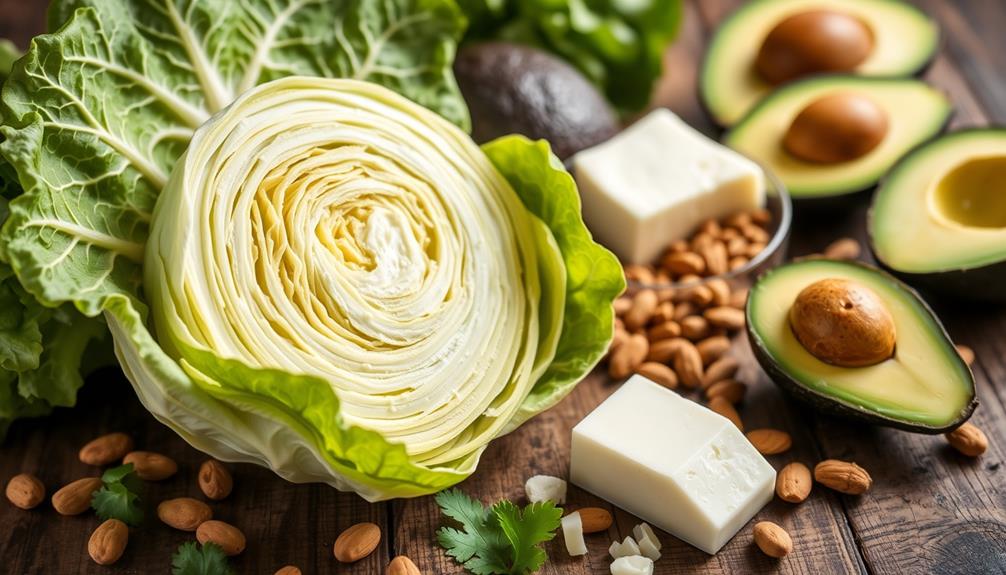
In the world of keto-friendly foods, cabbage stands out as a nutritional powerhouse. With its impressive low net carbs, you can easily incorporate cabbage into your keto diet without worrying about exceeding your carb limit. Raw green cabbage contains about 2.9 grams of net carbs per cup, while napa cabbage is even lower, offering less than 2 grams per cup. This makes it an ideal choice for anyone looking to keep their carb intake minimal.
Additionally, incorporating cabbage into your diet can be beneficial for overall health and wellness, as it's financially accessible for many and can be sourced easily.
Here's what makes cabbage a great addition to your meals:
- Low Calorie: At just 25 calories per cup, cabbage allows you to enjoy large portions without guilt.
- High Fiber: With around 2 grams of fiber per cup, it supports digestion and helps with weight management.
- Versatile: Use cabbage in stir-fries, salads, or as a substitute for higher-carb ingredients in various recipes.
- Nutrient-Rich: Packed with vitamins and minerals, cabbage adds essential nutrients to your diet.
Frequently Asked Questions
How Much Cabbage Can I Eat on Keto?
You can eat 1-2 cups of cabbage daily on a keto diet. With low net carbs per serving, it fits well within your daily carb limit, but always watch your portion sizes for accuracy.
Is Cooked Cabbage High in Carbs?
Think of a garden, lush with veggies. Cooked cabbage isn't high in carbs; it only has about 4.7 grams net carbs per cup. So, you can enjoy it without worrying about your carb count!
What Vegetables Are off Limits for Keto?
On a keto diet, you should avoid starchy vegetables like potatoes, corn, and peas, as well as root veggies like carrots and beets. Sweet potatoes and certain squashes also don't fit well within low-carb guidelines.
What Veggies Can I Eat on Keto?
While starchy veggies like potatoes are off-limits, you can enjoy low-carb options like cabbage, spinach, and zucchini. These nutritious choices will keep your meals exciting and aligned with your keto goals.
Conclusion
Incorporating cabbage into your keto diet isn't just easy; it's delicious and versatile, too! You might think it's too low in calories to be filling, but cabbage is packed with fiber that keeps you satisfied. Plus, its various forms—like sauerkraut or coleslaw—offer tasty ways to enjoy it. So, whether you sauté it, roast it, or toss it in salads, you can confidently embrace cabbage as a flavorful, low-carb staple in your meals.
